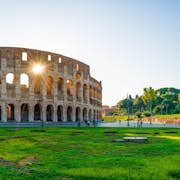
Transportation Only: Roundtrip by Shuttle Bus from Naples to Pompeii
- Duration: 4h 50mins
- Live guide in English, German, French, Italian, Spanish
Walk through the preserved streets of an ancient city frozen in time by Mount Vesuvius
24 options • from $21.14
























Combine Pompeii with other Pompeii favorites. Some things are better together.
Tiqets provides a range of different Pompeii ticket options that you can download easily to your smartphone. Simply scroll through the options on this page, make your choice, and your tickets will be sent to you via email instantly.
Alternatively, you can buy tickets in person at Pompeii. However, it’s highly recommended that you buy your tickets in advance to avoid long queue times. It’s no fun standing in line during the summer months!
There are a lot of options available to visitors looking for Pompeii tickets – it can be hard to choose!
Purchasing a basic reserved entry ticket does exactly what you would expect. You’ll receive entry to wander the Pompeii ruins at your leisure, allowing you to see the Forum with Vesuvius in the background, the aqueduct, street fountains, public baths, and more.
The best value of Pompeii tickets includes a guided tour of the ruins – why go all that way only to miss the fascinating history and context of Pompeii?
There are also tickets with guided transport from Naples and Rome, which are a great way to save money and stress while traveling.
There are several private car parks surrounding the Pompeii ruins. You’ll be spoiled for choice once you arrive, with chirpy attendants all vying for your business. The going rate to park is around €10 for the day.
Out of all the ancient treasures excavated in the lost city, the Pompeii bodies are the most visceral. The Pompeii bodies were found when archaeologists detected cavities in the dig site wherever they located human bones. Each hollow cavity preserved a three-dimensional negative imprint of the victims exactly as they were when Vesuvius smothered the city.
By pouring liquid plaster into these cavities, letting it set, and carefully excavating the results, archeologists uncovered not just the exact spot where people died, but a haunting sculpture of their final moments. Preserved in suspended animation nearly 2,000 years later, the Pompeii bodies are a mind-blowing sight to behold.
The House of the Vettii is one of the most spectacular villas in Pompeii. Home to a remarkable collection of frescoes, the villa was owned by the Vettii brothers, two former slaves who became freedmen and eventually successful wine merchants.
The Vettii brothers had bold taste in interior design; their house is like a walk-in art gallery of majestic frescoes depicting a myriad of dramatic scenes from Greek mythology. You can see demigod Herakles strangling a tangle of serpents, Ixion being tied to a flaming wheel by Hermes, legendary hero Achilles on Skyros, a wrestling match between Pan and Eros, Dionysus discovering Ariadne, and lots more. Stopping by the House of the Vettii is a must when visiting Pompeii.
Easily the most grandiose of all the buried treasures of Pompeii, the Pompeii amphitheater is the oldest surviving Roman amphitheater and the first to have been built out of stone.
An absolute must-see, the Pompeii amphitheater might be slightly smaller than the mighty Colosseum in Rome, but it still had the capacity for around 11,000 spectators. Needless to say, the amphitheater of Pompeii is in significantly better condition too. Buried under several meters of compacted ash that sealed out all moisture, it was protected from the elements for thousands of years. This ancient arena is as breathtaking as any other ruins in Italy.
Mount Vesuvius is an ominous specter that looms over the city of Pompeii. It's a constant, bone-chilling reminder of the city's fiery fate. So while you're in town, why not show the mountain who's boss and visit Mount Vesuvius? While it's still an active volcano, there are frequent tours to the summit and the risk is low thanks to modern seismology. There are lots of ways to visit Mount Vesuvius, from fully guided tours to hiking trails, special tours with wine tastings, and more.
The Pompeii Baths prove that if there was one thing the Romans loved more than gladiator death matches, it was a nice warm bath. These ancient wellness spas were central to life in the Roman Empire, and the Pompeii baths are some of the best-preserved examples of Roman baths anywhere, despite the earthquakes, volcano eruptions, and war they've endured.
There are three large public bathhouses in total in Pompeii: the Stabian Baths, the Forum Baths, and the Central Baths. They all shared a similar design, with spectacular art and remarkable engineering being the recurring theme. There are beautiful frescoes on the walls and ceilings and decorative terracotta statues of gods and heroes. Snooping around the Pompeii baths is a total must.



Pompeii was lost to us for many centuries until it was rediscovered again, initially in 1599, and properly in the 1700s. It is one of the world's greatest archaeological sites. The volcanic eruption wiped out the population of Pompeii, but the town they lived in was remarkably well-preserved because of the combination of ash and lack of moisture that sealed the town, and essentially turned it into a time capsule.

Majestic frescoes, steamy graffiti, and one angry volcano, here's all you need to know about visiting the lost city of Pompeii.





